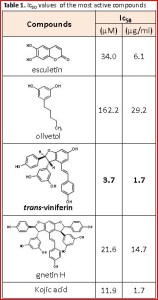Dedicated to the memory of Prof. Francois Tillequin
Tyrosinase is a multifunctional copper-containing enzyme, playing a key role in melanin biosynthesis. Although melanin has mainly a photoprotective function, the accumulation of an abnormal amount of melanin in different specific parts of the skin, resulting in more pigmented patches, might become an esthetic problem; tyrosinase inhibitors can be useful for the treatment of such dermatological disorders [1]. The aim of our project was the evaluation of skin whitening effects of plant derived small molecules in order to investigate their potential as new cosmetic agents. For this reason, an assembly of plant derived natural products were evaluated for their anti-hyperpigmentation properties. The importance of natural products as a basis for the development of health-promoting agents has attracted the interest of the scientific community and industries worldwide. Natural products are nowadays employed for skin diseases in various cosmetic formulations [2, 3].
The tested compounds belonged to several categories: Flavonoids, alkaloids, terpenes, lactones, lignans, coumarins, quinones, acetophenones, stilbenes, thiophenes, polyacetylenes, phenolic acids, phenylethanoid glycosides and benzofurans. Anti-tyrosinase (anti-hyperpigmentation) activity of the selected molecules was determined using the 96-well microplate method described by Masuda et al. [4]. The produced amount of dopachrome was measured at 475 nm and the percentage inhibition of the tyrosinase activity was calculated. Kojic acid was used as positive control. 480 compounds with structurally diverse scaffolds and decoration patterns were selected from in-house libraries and were screened for their ability to inhibit tyrosinase activity. According to the results of the biological evaluation 4 compounds were found to be very active (50% inh>50 μg/ml-Figure 1), and 9 compounds belonging to alkaloids, flavonoids, coumarins and stilbenes were found to be weak inhibitors (150 μg/ml>50% inh>75 μg/ml).
According to the biological screening data, the development of skin whitening agents could benefit from research oriented towards natural products. The results presented herein showed that, especially phenolic compounds, were capable to inhibit dose-dependently L-DOPA oxidation catalyzed by tyrosinase and could thus have high potential for use as ingredients in products that prevent skin pigmentation. Based on the structures of active molecules, an extract library derived from approximately 1800 plant species of the worldwide flora was established. Inhibition of extracts’ tyrosinase activity will be determined and the promising ones will be further studied for their qualitative and quantitative content in tyrosinase inhibitors.
[1] Gillbro J.M. & Olsson M.J. Int. J. Cosmetic Sci. 2011, 33, 210-221
[2] Germano, M.P. et al. Fitoterapia 2012, 83, 877–882
[3] Nesterov, A. et al. Drugs Fut. 2008, 33, 945-954
[4] Masuda T. et al. Biosci. Biotechnol. Biochem. 2007, 71, 2316-2320
Poster presentation in International Congress on Natural Products Research, Jul 28 – Aug 1, 2012, New York, USA



